SSRC grant funds a BC Summer 2020 research project, "Autoethnographies of a Pandemic from Brooklyn’s Epicenter"
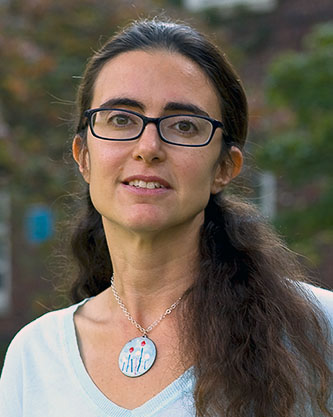
Distinguished Professor of Political Science Jeanne Theoharis
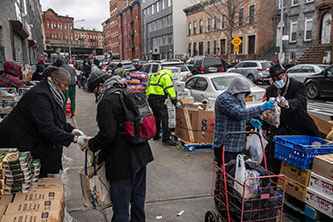
Brooklyn street-level food distribution during the early days of the lockdown.
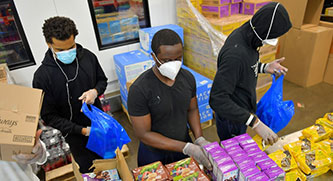
Foodbank during the COVID lockdown.
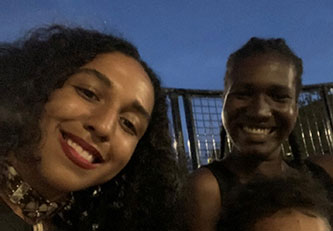
Participants Jasmaine Brathwaite and Assata Gonzalez
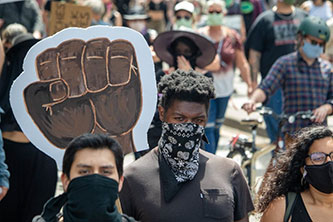
Black Lives Matter rally (Flickr/David Geitgey Sierralupe).
In spring 2020, as the novel coronavirus began to take hold, the Social Science Research Council (SSRC) recognized that the reality of the COVID-19 pandemic also foregrounded the harsh and disturbing reality of its disparate impact on communities of color and the poor. Recognizing that these groups were taking a much greater hit than other groups, the SSRC announced a new grant initiative for research on inequality and the pandemic. Distinguished Professor Jeanne Theoharis and graduate student Dominick Braswell, being acutely aware that even in research on inequality, the voices of young people in the Brooklyn community were rarely heard, submitted a proposal for a pandemic autoethnographies project so that Brooklyn College students could take the lead in analyzing and contextualizing what was happening to them and their community. The School of Humanities and Social Sciences is extremely proud that Theoharis and Braswell's proposal for Autoethnographies of a Pandemic From Brooklyn's Epicenter was one of the few research projects that the SSRC funded through this initiative. Organized and conducted by Theoharis, American Studies Professor Joseph Entin, and Africana Studies alumnus Dominick Braswell, the project provides a window into students' experiences during the worst of the COVID-19 outbreak.
The result of the grant was an intensive summer program for 18 Brooklyn College student researchers from deeply impacted communities who agreed to conduct research on what was happening in their neighborhoods. The student researchers spent the summer crafting autoethnographies of their family and community experiences of the pandemic. Furthermore, the group held biweekly meetings and a mini-conference so they could think about, compare, and share what they were learning about the issues. As the professors wrote in their introduction to the project, "Each student picked an issue to anchor their piece around, marrying their own personal experiences with strands of research to amplify the context." Thus, the students' work documented and preserved a series of histories that capture the realities of this moment in New York City's hardest-hit communities from their own standpoints.
The essays describe the fears and uncertainties Brooklyn College students faced in the spring. They make clear that the virus incredibly exacerbated students' and their families ongoing struggles with long working hours, food insecurity, and lack of health insurance, among other deeply felt challenges. They illuminate the resilience of immigrant communities and the invaluable work a cross section of New York's black and other people of color performed to keep the city functioning. Furthermore, the essays reveal the organizing and community mobilization that sustained Brooklynites as the state failed to provide adequate basic support. They tell stories that were not being shown in the media, by people who were not being interviewed. Indeed, the essays were foregrounded by the reality that the majority of Brooklyn College students come from families with incomes of $40,000 or less, that 48 percent of CUNY students experience food insecurity within a given month, and that 14 percent were homeless within the previous year. The essays depict the massive impact that the virus had on an already vulnerable population, explaining that it was, as the introduction stated, "exacerbating preexisting inequalities, creating new ones, and leading to new forms of mutual aid and organizing."
Not only did these autoethnographies preserve an essential historical record, documenting the impacts on these communities in the initial U.S. epicenter of the pandemic, but they were observed and recorded by the young members of those very communities, not by professional journalists nor even professional researchers. The narratives composed by these black, Latinx, and South Asian students not only recount moving tales of individual and collective struggle, but also serve to point scholars to new directions of critical research in those areas.
Eight of the student essays were published as part of a two-week series in Black Perspectives, the blog of the African American Intellectual History Society, which was launched on October 12. The introduction was written by Theoharis, Entin, and Braswell. The complete set of 18 autoethnographies have been deposited at the Brooklyn Historical Society and the Brooklyn College COVID-19 Project archive.
Back to Critical Thinking — December 2020





